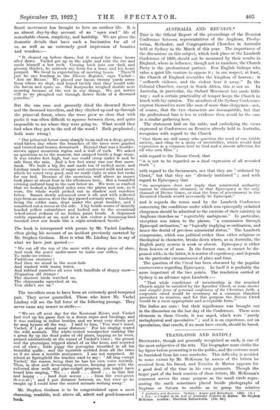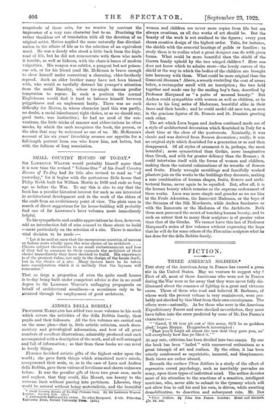TRANSLATOR AND DANDY.t BIOGRAPHY, though not generally recognized as such,
is one of the most subjective of the arts. The biographer must clothe the lay figure before presenting it to the public, and the costume must be furnished from his own wardrobe. This difficulty is avoided to some extent by Mr. McKenna by means of the letters he received from his friend, and Teixeira de Mattos appears for a good deal of the time in his own garments. Though the larger part of the book consists of these letters, Mr. McKenna's comment serves the same purpose as the small circle repre- senting the earth sometimes placed beside photographs of Neptune or Saturn to enable us to grasp the relative • Australia and Reunion. Sydney : Angus and Robertson. 1922. [36.] t Tax: e Chapter in the Life of Alexander Teixeira de Matto.. By Stephen McKenna. Loudon: Thornton Butterworth. 1105. 8d.1 magnitude of these orbs, for we receive by contrast the impression of a very rare character lost to us. Practising the rather thankless art of translation with all the devotion of an original artist, Mattes applied the same naturally fine discrimi- nation to the affairs of life as to the selection of an equivalent word. He was a dandy who stood a little back from the high- road of life, but he did not remonstrate with those who made it terrible, as well as hideous, with the chars-i-bancs of modern vulgarities. His weapon was subtler, a pungent but not poison- ous wit, or for his friend (and Mr. McKenna is brave enough to show himself under correction) a charming, elder-brotherly reproof. Such an elder brother many have not been blessed with, who would so tactfully distract his younger's attention from the maid Banality, whose too-ample charms proffer temptation to repose. In such a position the normal Englishman would find it hard to balance himself between priggishness and an unpleasant laxity. There was no such difficulty for Mattes, in whose character (and this was partly, no doubt, a racial inheritance) right choice, or as we should say, good taste, was instinctive ; he had no need of the con- ventions, the little tricks of manner and abbreviations he often mocks, by which the snob recognizes the book, the person, or the idea that may be welcomed as one of us. Mr. McKenna's account of his six years' friendship arouses our appetite for a full-length portrait from one who knew him, not better, but with the fullness of long association.



































 Previous page
Previous page